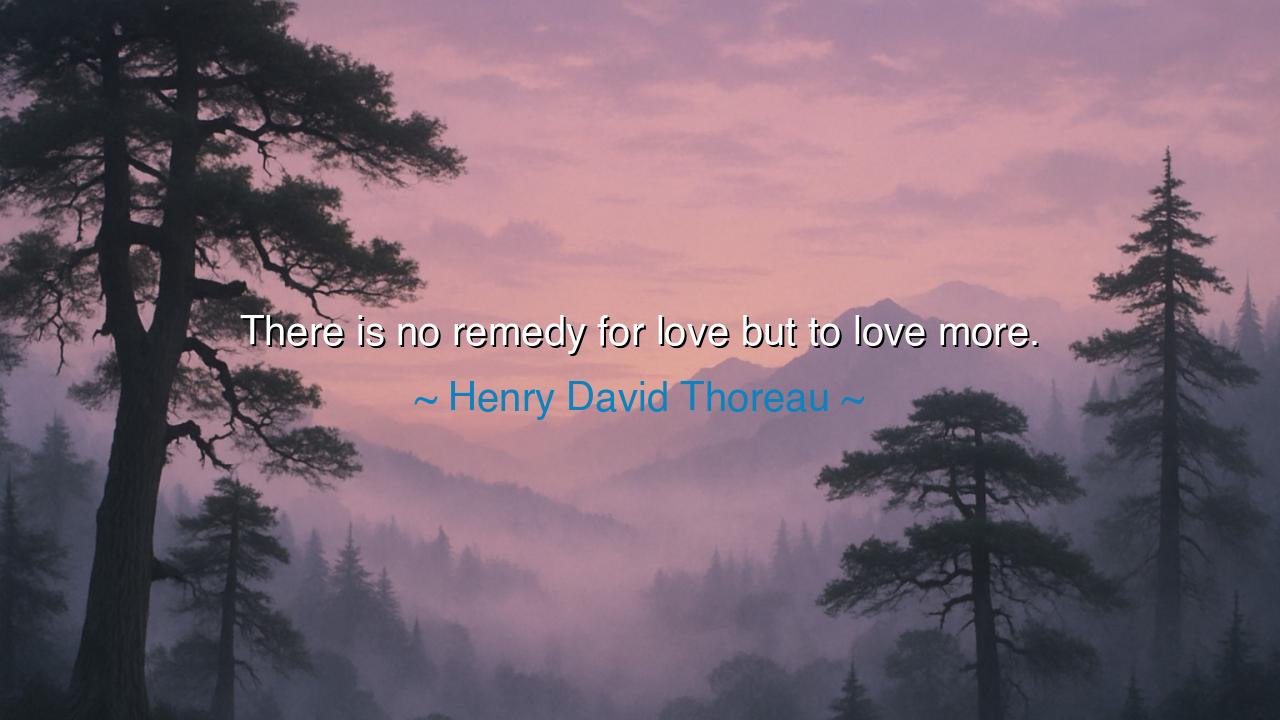
There is no remedy for love but to love more.






“There is no remedy for love but to love more.” – Henry David Thoreau
Thus spoke Henry David Thoreau, the philosopher of Walden Pond, whose heart sought truth not in the noise of cities but in the quiet rhythm of the soul. In this simple yet profound declaration, he unveils the eternal paradox of love — that its wounds are not cured by withdrawal, pride, or distance, but by more love itself. To love is to expose oneself to joy and pain, to beauty and loss. When the heart breaks, it longs to close; when love disappoints, it wishes to retreat. But Thoreau, in his wisdom, calls the soul to a higher path — to answer love’s suffering not with fear, but with expansion.
When Thoreau says, “There is no remedy for love but to love more,” he speaks from the deep well of experience that all who have loved come to know. Love, once awakened, cannot be quieted by avoidance or reason. It grows by giving, not by withholding. The heart, like a flame, is not extinguished by sharing its light; rather, it burns brighter. Thus, Thoreau teaches that the cure for the pain of love is not to love less, but to widen the circle of love — to let it transcend the one who wounded you, to let it become compassion for all.
The origin of this truth can be traced to Thoreau’s own life and philosophy. A disciple of transcendentalism, he believed that love was not merely human affection but a divine energy — the essence of the universe flowing through all things. To deny love, then, is to deny life itself. He lived much of his life in solitude, yet his solitude was not isolation; it was communion with nature, with spirit, and with the boundless love that connects all beings. When he lost friends or faced disappointment, he did not grow bitter, for he saw that every form of love — romantic, platonic, spiritual — was a step toward union with the infinite.
The ancients, too, understood this sacred truth. Lao Tzu taught that water, the softest of things, conquers the hardest. Jesus said, “Love your enemies,” for in loving even those who hurt us, we transcend the boundaries of the self. The Buddha spoke of compassion as the medicine for all suffering. And Thoreau, echoing these eternal voices, reminds us that love is not a possession to be guarded, but a force to be released. When love brings pain, the answer is not to turn inward in fear, but to let the heart grow vast enough to hold both pain and beauty at once.
Consider the life of Mother Teresa, who served the poorest of the poor in the slums of Calcutta. Her work was born not from comfort, but from heartbreak — from seeing suffering so immense that lesser souls would have despaired. Yet, rather than withdraw, she loved more. Every wound she witnessed became a call to deeper compassion. She once said, “If you love until it hurts, there can be no more hurt, only more love.” Her life was the living embodiment of Thoreau’s teaching: the remedy for love’s sorrow is to increase, not diminish, the capacity of the heart.
Love, when wounded, often turns to self-protection — but such protection is a slow death. To love more is to be reborn. It does not mean to ignore betrayal or loss, but to refuse to let them poison the spirit. It is to take the pain of personal love and transform it into universal compassion. As fire refines gold, so love refines the soul. Every heartbreak becomes an initiation into greater wisdom; every disappointment an invitation to see that love is not a transaction, but the essence of being itself.
So, my listener, when you find yourself broken by love, do not retreat. Do not build walls where there once were bridges. Instead, follow Thoreau’s counsel: love more. Love the world that remains, love the ones who stay, love the self that still feels. Love not because it is safe, but because it is true. For in the end, love is both the ailment and the cure — the wound and the healing hand. And when you have loved beyond reason, beyond expectation, beyond fear, you will discover what the sages knew from the beginning: that to love more is to live more, and that love, infinite and eternal, is its own remedy.






AAdministratorAdministrator
Welcome, honored guests. Please leave a comment, we will respond soon